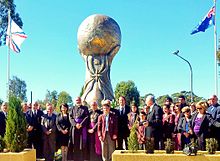ܐܬܘܪ̈ܝܐ ܕܐܘܣܛܪܠܝܐ | |
|---|---|
 Assyrians standing next to the genocide monument in Western Sydney. | |
| Total population | |
| 61,000 ~ 70,000 (by ancestry, 2022)[1] | |
| Regions with significant populations | |
| Sydney Melbourne | |
| Languages | |
| Neo-Aramaic, English | |
| Religion | |
| Christianity (majority: Syriac Christianity; minority: Protestantism) | |
| Related ethnic groups | |
| Assyrian Americans, British Assyrians, Assyrian Canadians |
Assyrian Australians (Syriac: ܐܵܬܘܿܪ̈ܵܝܹܐ ܕܐܘܼܣܛܪܵܠܝܼܵܐ), refers to ethnic Assyrians possessing Australian nationality. They are descended from the Northern Mesopotamian region, specifically the Assyrian homeland. Today, their homeland is a part of North Iraq, Southeast Turkey, Northwest Iran and Northeast Syria.
According to the census, 40,218 persons are Assyrian, 21,166 identified themselves as having Chaldean ancestry.[2] The majority of Assyrian Australians have immigrated from Iraq, Iran, Syria, Jordan and the Caucasus. The first Assyrians arrived in Australia in the 1950s, to flee from the 1958 revolution in Iraq.
Of the 61,400 Assyrians in Australia, 40,218 are members of the Assyrian Church of the East or Ancient Church of the East and 21,172 are members of the Chaldean Catholic Church. The City of Fairfield, in Sydney, has the most Assyrians in Australia, with 75% of Assyrians living in that area. 95% of Fairfield's Iraqi-born population are of Assyrian ancestry. Fairfield LGA has one of the most predominant Assyrian communities in the diaspora, where one in every ten person is Assyrian. In contrast to other migrants, Assyrians have the highest rate of acquiring the Australian citizenship.[3]
In the 1980s, the Iraq-Iran war resulted in significant numbers of Assyrians fleeing Iraq and applying for refugee status. In the early 2000s, 5% of Australia's humanitarian immigrants identified as being adherents of Syriac churches. In May 2013, the Assyrian genocide was recognised by the New South Wales state parliament.[4][5] Assyrian-Australians have established various clubs, social organisation, churches and language schools. Representing only 0.13% of Australia's overall population, Assyrians are considered to be a successful minority group.[6]
- ^ "CULTURAL DIVERSITY IN AUSTRALIA, 2016". Australian Bureau of Statistics. 27 June 2017. Archived from the original on 9 July 2017. Retrieved 27 June 2017.
- ^ Kinarah: Twentieth Anniversary of Assyrian Australian Association 1989, Assyrian Australian Association, Edensor Park.
- ^ Community Relations Commission For a Multicultural NSW 2004, Cultural Harmony. The Next Decade 2002–2012 (White Paper), New South Wales Government, Sydney South.
- ^ "NSW Parliament formally recognises Assyrian genocide as Smithfield MP Andrew Rohan shares tale of parents' survival". The Daily Telegraph. 14 May 2013. Retrieved 17 March 2015.
- ^ "Assyrian Genocide Monument Unveiled in Australia". Assyrian International News Agency. 8 July 2010. Archived from the original on 2 September 2010. Retrieved 31 August 2010.
- ^ Winter, I. 2000, Towards a theorized understanding of family life and social capital, Working paper No. 21, April, Australian Institute of family Studies, Melbourne
